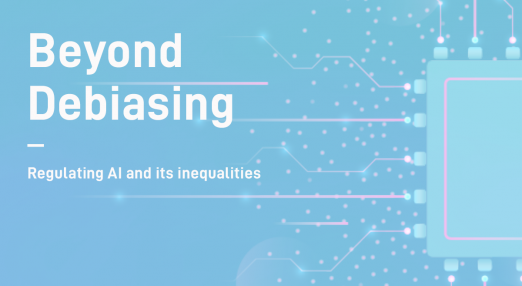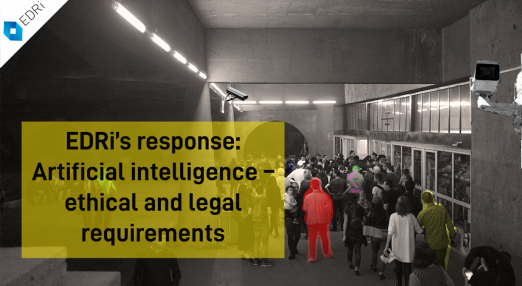AI
Filter by...
-

Civil society calls on the EU to put fundamental rights first in the AI Act
Today, 30 November 2021, European Digital Rights (EDRi) and 119 civil society organisations launched a collective statement to call for an Artificial Intelligence Act (AIA) which foregrounds fundamental rights.
Read more
-

Amnesty International calls to ban discriminatory algorithms in its report Xenophobic Machines
On 25 October 2021, EDRi observer Amnesty International published a report on the use of algorithmic decision-making (ADM) system by the Dutch tax authorities to detect fraud. The report shows how discrimination and racial profiling were baked into the design of the ADM system.
Read more
-

Do no harm? How the case of Afghanistan sheds light on the dark practice of biometric intervention
In August 2021, as US military forces exited Afghanistan, the Taliban seized facial recognition systems, highlighting just how a failure to protect people’s privacy can tangibly threaten their physical safety and human rights. Far from being good tools which fell into the wrong hands, the very existence of these systems is part of broader structures of data extraction and exploitation spanning continents and centuries, with a history wrapped up in imperialism, colonialism and control.
Read more
-

AI Regulation: The EU should not give in to the surveillance industry
Although it claims to protect our liberties, the recent European Commission’s legislative proposal on artificial intelligence (AI) promotes the accelerated development of all aspects of AI, in particular for security purposes.
Read more
-

Artificial intelligence – a tool of austerity
This week Human Rights Watch published a much-needed comment on the EU’s Artificial Intelligence Regulation. As governments increasingly resort to AI systems to administer social security and public services more broadly, there is an ever-greater need to analyse the impact on fundamental rights and the broader public interest.
Read more
-

Facebook deleting facial recognition: Five reasons to take it with a pinch of salt
Voluntary self-regulation from tech giants is superficial and no replacement for actual legislation
Read more
-

MEPs poised to vote blank cheque for Europol using AI tools
This week, MEPs recognised the dangers of certain uses of Artificial Intelligence (AI) in criminal justice. A strong majority rallied around the landmark AI in criminal matters report by the European Parliament's Civil Liberties, Justice and Home Affairs (LIBE) committee, which opposes AI that 'predicts' criminal behaviour and calls for a ban on biometric surveillance.
Read more
-

The EU Parliament Took a Stance Against AI Mass Surveillance: What are the Global Implications?
The European Parliament's resolution on artificial intelligence in criminal law and its use by the police presents an opportunity for the EU to reconsider its role in the development of such tools, their sale, or use as part of its counter-terrorism and anti-immigration policies abroad.
Read more
-

Big Tech platforms are hurting us. 50 organisations urge the EU to #FixAlgorithms
The list of negative consequences of how dominant online platforms shape our experience online is neither short nor trivial. From exploiting users’ vulnerabilities, triggering psychological trauma, depriving people of job opportunities to pushing disturbing content to others, these are just some examples. While members of the European Parliament debate their position on the Digital Services Act (DSA), EDRi’s member Panoptykon Foundation (Poland), together with 49 civil society organisations from all over Europe, including EDRi, Amnesty International, Article 19, European Partnership for Democracy and Electronic Frontier Foundation, urge them to ensure protection from the harms caused by platforms’ algorithms.
Read more
-

Human rights focus missing in the State of the Union 2021 address
On 15 September, the yearly State of the Union 2021 address took place. The address is the event where the European Commission evaluates the preceding year and the Commission President announces key legislation or reactions to crucial international events.
Read more
-

Booklet: If AI is the problem, is debiasing the solution?
The development and deployment of artificial intelligence (AI) in all areas of public life have raised many concerns about the harmful consequences on society, in particular the impact on marginalised communities. EDRi's latest report "Beyond Debiasing: Regulating AI and its Inequalities", authored by Agathe Balayn and Dr. Seda Gürses,* argues that policymakers must tackle the root causes of the power imbalances caused by the pervasive use of AI systems. In promoting technical ‘debiasing’ as the main solution to AI driven structural inequality, we risk vastly underestimating the scale of the social, economic and political problems AI systems can inflict.
Read more
-

EDRi submits response to the European Commission AI adoption consultation
Today, 3rd of August 2021, European Digital Rights (EDRi) submitted its response to the European Commission’s adoption consultation on the Artificial Intelligence Act (AIA).
Read more
